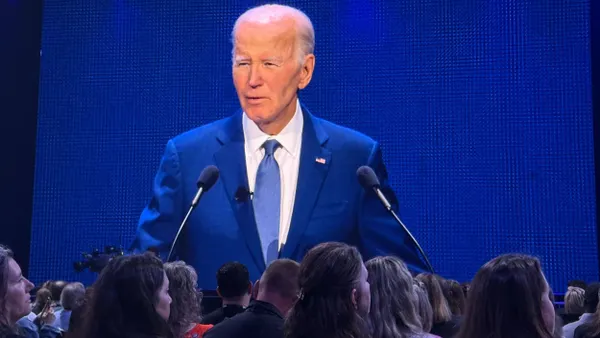The recent paradigm shift in Washington, D.C. calls for transformation as well as trepidation. Observers in and around Capitol Hill wonder out loud whether the new administration will call for drastic changes to hotly debated policies relevant to American workplaces.
But on some level, that change isn't unexpected. From the FLSA overtime rule and the ACA to the changing nature of the workforce, the HR landscape fought to meet each challenge that an already tumultuous 2016 threw its way.
Powerful solutions have captured the attention of the industry — and it's not just Silicon Valley's startup kingdom doing all the work. New models, representing innovation and technological advances, are everywhere — even amongst some of the United States' oldest companies.
We present the 2016 Dive Awards for the HR industry. We planned in January, solicited suggestions for nominees from readers in August, then consulted industry insiders to help us narrow down the nominees. Ultimately, the winners were chosen by the editors of HR Dive. Here are our 10 winners for 2016.
Executive of the Year
Winner: Mark Levy @ Airbnb
Airbnb is at the forefront of one of today's most popular HR trends — making the workplace into an "experience." Mark Levy, global head of employee experience of Airbnb, championed this philosophy and ensured employee experience was the linchpin of his HR mission.
The company is heralded for connecting its benefits offerings with its culture, including healthy, worldly food menus and an office that reflects the company's mantra that you can be "at home anywhere."
HR practitioners unanimously said Levy and Airbnb bring some of the most interesting innovation to the space, particularly taking note of the way the company transformed its internal culture while also providing a "quality experience" for customers. Levy changed his title from Chief Human Resources Officer to his current one to better reflect the nature of his job.
Other nominees: Starbucks' HR team, National Business Group on Health's Brian Marcotte, Adecco's Joyce Russel, Google's retiring Lazlo Bock.
Company of the Year
Winner: General Electric
In the face of a changing job market and workforce, GE's efforts are worthy of two awards. Its push toward new employee systems is watched by many in the industry as it has long been seen as an innovator.
GE's employee performance ranking system was used as a model for decades, and it made news when the company decided to scrap the annual system for a periodic review system. That change has swept the industry. It's just one way GE has proven that powerful HR transformation can happen even when faced with legacy systems and older programming. More later on its achievement in the Transformation category.
Other nominees: Google, American Express, Workday, LinkedIn.
Most disruptive idea
Winner: Gig economy
The world of work is evolving — and nothing makes that fact clearer than the way the gig economy continues to develop and take shape. Uber and its beleaguered model, once the poster child for gigs and the affordability and flexibility they can provide, has faced litigation for allegedly expecting drivers to act as employees while paying them for independent contractor work.
The gig economy has opened up potential paths for "alternative retirement" in which older workers step in to fill gaps and mentor newer employees.

The HR Dive Panel
Dive Awards 2016
But gigs also extend to professional freelance and consulting work, which have emerged as potential solutions for talent shortages — an especially positive development for workers from all backgrounds that seek more flexibility. The gig economy has opened up possibilities for "alternative retirement" in which older workers step in to fill gaps and mentor newer employees. The potential (and potential hiccups) of the gig economy is why it lead the pack for most disruptive idea in HR.
Other nominees: Parental leave policies, growth of predictive analytics, microlearning, end of the annual raise/performance review, co-sharing offices and encouraging more flex-work and tele-work accommodations
Regulation of the Year
Winner: Overtime rule
The FLSA overtime rule change was perhaps the most controversial issue in employment law this year. In June 2015, the Labor Dept. announced its intention to increase the minimum exempt salary threshold for overtime pay, which would eventually be set at $47,476.
A ton of new workers had been set to receive overtime pay once the rule took effect Dec. 1 — an estimated four million, to be exact. But then Judge Amos Mazzant of the U.S. District Court in Eastern Texas allowed a preliminary injunction against the rule.
Employers nationwide now must consider the changes they've already made and how they will move forward from here. Experts don't suggest undoing any major new policies due to the morale issues they could cause, but it does create serious questions about what will happen next and how employers should prepare. As of publication, no permanent injunction has been filed — meaning any number of changes could take place between now and when the next administration takes office.
Employers will also want to keep track of potential changes to state FLSA laws. New York, for example, was acting ahead of the changes by mandating salary thresholds that, in some areas of the state, exceed those originally set by the Labor Dept.
Other nominees: OSHA post-accident reporting rule, Blacklisting rule, EEOC wellness rules/EEOC pay data reporting rule change, Various state equal pay laws
Obsession of the Year
Winner: Diversity
HR departments prioritized diversity on several fronts in 2016, from creating health benefits programs for transgender employees, to addressing the needs of employees with disabilities, to adopting language software programs as part of a larger global business strategy.
Yet despite progress in these and other areas, one of the biggest diversity problems discussed in 2016 has been the plight of women, particularly younger women. This is largely a reflection of cultural trends, with several high-profile instances of domestic violence and sexual assault having made the rounds of media coverage.
Women executives still make far less than their male counterparts, and women occupy only a fraction of positions in the C-Suite. There's a concerted need on all fronts to make early professional advancement more accessible to women.
As for other solutions? Looking toward the future, companies are planning to harness new technology, including AI, to reduce hiring biases. And to combat diversity issues of every sort, employee resource groups have helped organizations provide a sense of community and understanding for workers who may feel excluded.
Other nominees: Recognition and reward systems (personnel reviews, etc), managing millennials, the ACA, Finding a seat at the C-suite table
Biggest HR tech innovation
Winner: Predictive analytics
HR tech has made huge inroads in recent years thanks to the emergence of the cloud and mobile technologies. This year, the biggest conversation piece was the explosive growth of people analytics — and the confusion that accompanied it.
The rise of AI and better data analysis tools will only improve the capabilities of such technology, from healthcare and wellness to recruiting and retention.

The HR Dive Panel
Dive Awards 2016
One of the most curious takeaways about its rise: As conversation heated up, HR's actual movement in the space remained slow and risk averse. Some organizations remain uncertain about how and when to implement data analysis into their everyday function even as they recognize the growing need to do so. But those who are able to implement it on a larger scale have seen success on the customer and employee sides of the business. The real issue is figuring out what matters to the organization and applying data in a strategic way, rather than using it simply because the capability exists.
What's most interesting is what comes next. The rise of AI and better data analysis tools will only improve the capabilities of such technology, from healthcare and wellness to recruiting and retention.
Other nominees: Two-way employee scheduling apps, concierge benefits tools, mobile-enabled benefits tools, recruitment anti-bias technology
HR blog of year
Winner: Ask a Manager
The HR realm is filled with well-read blogs, but Alison Green's accessible, empathetic and forthright style won HR Dive's vote. While the blog features questions from employees or frontline managers, the site approaches common workplace grievances that may remind upper-level HR managers of the issues people face regularly — or, simply, of what not to do. Ever.
The blog also has a comment section worth reading. Not a common bit of praise for any part of the internet.
Other nominees: HR Bartender, Fistful of Talent, SHRM blog, Women of HR
Transformation of the Year
Winner: General Electric
One panelist noted that GE never assumes what worked the year before will work again the next — a key point of view for success in a quickly shifting job market.
On top of the ongoing performance review changes, GE has considered eliminating the annual raise and instead implementing a more rewards-based system. At least one of its buildings was renovated to an open-floor format that no longer has offices in the traditional sense. That trend is catching on particularly with companies that have high populations of millennials.
GE is a legacy company by every definition of the word, and its efforts to keep up with modern workplace trends is worthy of imitation.
Other nominees: The job market, Specialty pharmacy, IBM
Best hiring app
Winner: LinkedIn Recruiter
LinkedIn is a powerful brand name in the recruiting space, but it's earned its recognition. LinkedIn Recruiter was a majority favorite thanks to the constant innovation and accessibility the company pushes.
It's also made some serious strides this year, including the ability to add advanced career information and new ways for recruiters to communicate with clients. The Open Candidate feature is a new way for members to discretely indicate they are available for career opportunities, a boon to recruiters.
Naturally, big things are on the horizon since it was bought by Microsoft (pending regulatory approval, of course).
Other nominees: TheLadders, SmartRecruiters, BambooHR, Shiftgig Mobile Marketplace
Best learning/training program
Winner: Adobe Captivate
Learning programs must be flexible; that's why Adobe Captivate snagged our attention. Microlearning is the name of the learning game today, and Captivate allows learning leaders to create small, accessible programs that an employee can access at any time of the day. Today's learning programs depend on accessibility across multiple platforms, so Captivate's ability to create programs for mobile is a key point.
Other nominees: Jiffy Lube International, Storyline, G-Cube, Paychex
The 2016 Dive Awards were distributed across our twelve vertical markets: BioPharma, CIO, Construction, Education, Food, Healthcare, HR, Marketing, Retail, Supply Chain, Utility, and Waste. Click here to see all of the Dive Awards winners.













